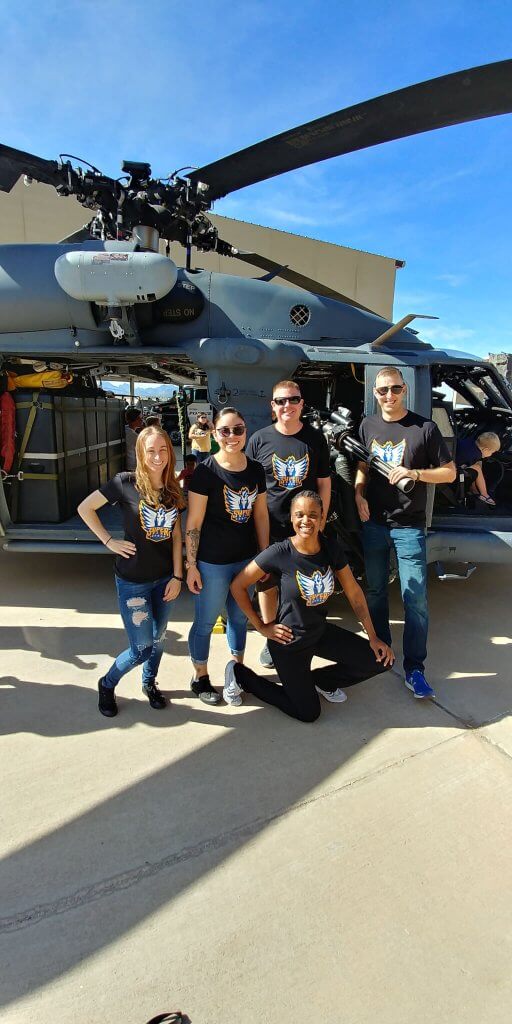Enlisted airmen from the 943rd Rescue Group are transforming traditional leadership techniques to motivate the junior ranks within their unit.
The Super Six, a group based out of Davis-Monthan Air Force Base in Tucson, AZ, uses a mix of community service projects and professional growth opportunities to develop leaders within the Air Force Reserve. Priorities include bolstering morale, encouraging involvement, and dignifying the wingman culture. The organization’s president, Tech. Sgt. Billy Lewis, says it’s the second time the idea has been executed and the response has been positive.
“The Super Six previously got started in our group five years ago, and it only lasted for about a year, and it was hard to get that participation with the reserve group. We just needed that something for our junior enlisted to kind of help them and to make them grow,” he explained.
Super Six, which represents ranks E1 to E6, is founded on three pillars:
- Helping the junior enlisted,
- Assisting the 943rd Rescue Group as a whole, and
- Giving back to the surrounding community.
Encouragement without orders
There is often a joke, especially among junior enlisted members, about the long-held military practice of being voluntold-involuntarily being volunteered to do something. So, the difficulty for senior NCOs and officers, like Super Six’s governing members, becomes creating these types of camaraderie-building activities without making it feel forced, which Lewis adds is a multi-layered challenge in the reserve component.
“That’s the challenge that we face every month because we’re reservists, so we only meet one weekend a month, and we only get one hour, and everybody’s busy you know doing their job, maintaining their training, so we had to get kind of creative this year,” Lewis, a client systems technician, said. “This year we started our professional development courses for our junior enlisted. We wanted to give them tools that they could use—not only inside the Air Force—but take it outside because the majority of the time is working full-time or supporting your family.”
Some of those courses include financial briefings around the holidays to get a budget set, educational briefings on tuition assistance, and guidance on writing bullets for airmen under their supervision.
Meeting their needs
Group Vice President, Tech. Sgt. Aries Medina, who is prior active, has been with the group since the onset. She says Super Six fills a gap.
“I think it’s important (for junior enlisted to be involved) because being most of them are traditional reservists and it’s hard sometimes for traditional reservists to do what’s expected military-wise on their off time, so I think it’s important for them to be involved in the group because we facilitate the stuff that they need for professional development, community involvement, things of that nature,” she said.
And activities aren’t solely focused on formal projects. In some instances, Super Six events are just about getting together.
“We try to motivate them by incorporating things that they would like,” Medina said. “It’s not always necessarily about volunteering or fundraising, sometimes we have events where it’s just us hanging out and getting to know the people that you work with or getting to know the other members in the unit that you don’t necessarily see on a daily basis.”
Bridging the divide
Earlier this year, the Department of Defense launched a new initiative aimed at helping civilian communities better understand the US military. Tech. Sgt. Lewis stressed the importance of units using engagement to connect on a local level.
“It’s very important to get involved with the community because the community, all they see is our helicopters fly off the base. They don’t know what that helicopter’s doing, they don’t know what our mission is. You know, the sacrifices that the people on those helicopters are doing to save the Marines, the Navy … and if the community doesn’t know what we do, it’s our job to teach them and to build that relationship,” he said.
An example of that type of relationship building occurred last weekend when Super Six members held a food drive collecting donations from squadrons to pay forward to the Community Food Bank of Southern Arizona in Tucson. They also had the opportunity to meet with Air Force Reserve Command Chief Master Sgt. Ericka Kelly.
To learn more about Super Six, visit the group on Facebook or Instagram.

